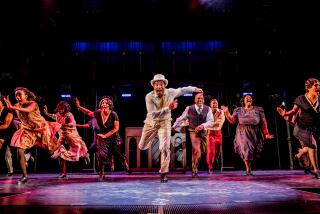John Levy dies at 99; personal manager for jazz greats
- Share via
John Levy, an accomplished bassist who became the first African American personal manager in the jazz field, has died. He was 99.
Levy, a National Endowment for the Arts Jazz Master, died in his sleep Friday at his Altadena home, said his wife, writer Devra Hall Levy. He had recently been treated for heart problems.
During his long career as a personal manager, Levy guided a stellar array of jazz artists — among them Cannonball Adderley, Betty Carter, Herbie Mann, Freddie Hubbard, George Shearing, Joe Williams and Nancy Wilson.
FOR THE RECORD:
John Levy obituary: The caption for a photo accompanying the obituary of jazz bassist John Levy in the Jan. 24 LATExtra section misidentified drummer Wallace Bishop as Walter Bishop. —
Levy took his place in the business area of jazz when segregation still existed. Jazz musicians, the majority of them African American, were confronted by demeaning travel and lodging conditions and often deprived of such potential income sources as their publishing rights. As their representative, Levy was determined to do everything he could to further the professional goals and improve the lives of his clients.
“The racial problems of the times, for many musicians, came out in their frustrations, but not in their appearance professionally,” Levy told Newsday in 2006. “They had to perform at the top of their game.... My main objective was to do as much as I could to promote those artists, to enhance their careers as much as I could.”
His success in doing so is spelled out in the professional lives of artists who worked especially closely with Levy.
Nancy Wilson, whose association with him began in 1959 and continued to the present, is one of the performers who have praised his method of dealing with an artist as a whole person.
“He was a great musician,” she told The Times in 2002, describing her initial decision to become a Levy client, “and I wanted someone who would know me as a person. I wanted a life, and he was a manager who would allow me to have a life because he understood.”
John Levy was born in New Orleans on April 11, 1912, and raised in Chicago. His father was a stoker on the railroad, his mother a midwife. Dropping out of high school, he played piano before switching to bass, supplementing his music goals with jobs as a hotel porter and a postal employee.
He worked the Chicago club scene in the early ‘40s, most visibly with jazz violinist Stuff Smith. Moving to New York in 1944, he played with the likes of Ben Webster, Milt Jackson and Erroll Garner in the jazz mecca of 52nd Street. Levy also backed Billie Holiday in her legendary sold-out Comeback Concert at Carnegie Hall in 1948.
In 1949 he joined the new George Shearing quintet, eventually becoming the group’s road manager in his transition to the business side of the music.
Levy sometimes minimized his skills as a jazz bassist, describing himself as “an average player.” Yet his bass playing provided the solid foundation for the Shearing quintet — a group that became one of the most prominent jazz ensembles of the late ‘40s and early ‘50s, selling nearly a million copies of their hit version of “September in the Rain.”
“John’s feeling about the bass,” his wife said, “was the same as his feeling about life — that he was put here to support others. The bass, with the bottom notes, was the foundation for the music. And his role at his desk was to provide the foundation and the support for the goals and dreams of his clients.”
His 2001 biography, “Men, Women, and Girl Singers: My Life As a Musician Turned Talent Manager” — written with his wife, Devra, the daughter of jazz guitarist Jim Hall — is an insightful view of jazz and the music business, illuminating his continuing efforts to assure that artists of all races and genders were treated fairly.
“We are put on this earth for a reason: to help people reach their potential,” he wrote. “I’d like to be remembered as someone who made it possible for George Shearing, Cannonball Adderley, Nancy Wilson, Wes Montgomery and dozens of others to bring music and joy into the lives of audiences all over the world.”
Besides his wife, Levy is survived by his son, Michael; daughters Pamela McRae, Samara Levy and Jole Levy; 14 grandchildren and numerous great-grandchildren.
More to Read
Start your day right
Sign up for Essential California for the L.A. Times biggest news, features and recommendations in your inbox six days a week.
You may occasionally receive promotional content from the Los Angeles Times.





















































